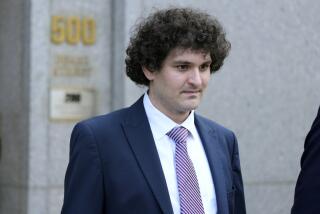Stiffer Penalties Urged for Insider Trading Crimes
NEW YORK â Judges came under sharp attack Wednesday for imposing only light sentences on defendants in Wall Streetâs insider trading scandal and thus for sanctioning greed and fraud in the financial community.
All of the convicted conspirators in the Dennis B. Levine insider trading case âshould have received much longer prison sentences than these judges seem willing to grant,â U.S. Atty. Rudolph W. Giuliani told a forum on insider trading and securities fraud sponsored by the New York Post. The fines and jail terms have been so insignificant, he said, that instead of setting an example that would help solve this âsystemic problem,â they are âannouncing you may as well do it and get away with it.â
Drawing laughter, American Stock Exchange Chairman Arthur Levitt Jr. added: âThere is no sentencing too severe. May I suggest Islamic law?â
So far, the maximum sentence passed on Levineâs co-conspirators has been a year and a day in prison, far less than the 20-year maximum prison term many faced but substantially more than such white-collar criminals historically have received.
Not until a majority of federal court judges adopts the attitude that âstealing information is no different than stealing money,â will longer sentences be imposed on white-collar criminals who profit illegally by trading on secret information about pending deals, said the forumâs other speaker, Ira L. Sorkin, former New York regional administrator of the Securities and Exchange Commission.
Still awaiting sentencing in the largest insider trading case ever prosecuted are the two men believed to be the schemeâs masterminds: former investment banker Levine himself and stock speculator Ivan F. Boesky.
Levine has pleaded guilty to four felony charges for his role in the scheme and is scheduled to be sentenced Feb. 18. Boesky has agreed to pay the government $50 million in fines and $50 million in illicit profit and to plead guilty to a single felony count. Both men are expected to receive longer jail terms than their co-conspirators even though their cooperation has been crucial to the governmentâs case.
Sorkin--who prosecuted a separate insider trading scheme, the so-called Yuppie case, just before leaving the SEC last year for private practice--also was critical of the deal that his former employer cut with Boesky just before the millionaire arbitrageurâs settlement with the SEC was made public.
Chiding the SEC for âselling out,â Sorkin said, âI would not have let him . . . liquidate before the public announcement.â His reference was to Boeskyâs liquidation of major stock holdings, with the SECâs blessing, just before the disclosure last November of his pattern of illegal trading. The SEC has repeatedly defended that controversial decision.
Giuliani, fielding questions about the three-month-long hiatus in disclosures about the Boesky-Levine case, said, âIt may take six months to a year to complete, maybe longer.â But he promised that aspects of the case will be made public as they become settled.
He also defended the deal struck with Boesky, which many consider too lenient. Had the government instead taken the Boesky case to trial, he said, âit would have taken us two or three years to prove the charges and they may never have been proved.
âAnd never, ever, in anyoneâs wildest imagination could we have expected to get $100 million from him.â
More to Read
Inside the business of entertainment
The Wide Shot brings you news, analysis and insights on everything from streaming wars to production â and what it all means for the future.
You may occasionally receive promotional content from the Los Angeles Times.










